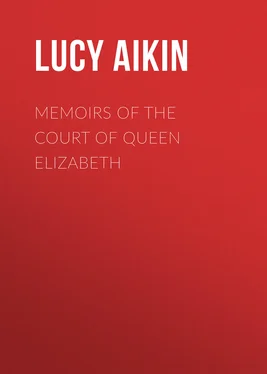Lucy Aikin - Memoirs of the Court of Queen Elizabeth
Здесь есть возможность читать онлайн «Lucy Aikin - Memoirs of the Court of Queen Elizabeth» — ознакомительный отрывок электронной книги совершенно бесплатно, а после прочтения отрывка купить полную версию. В некоторых случаях можно слушать аудио, скачать через торрент в формате fb2 и присутствует краткое содержание. Жанр: foreign_prose, История, foreign_edu, foreign_antique, на английском языке. Описание произведения, (предисловие) а так же отзывы посетителей доступны на портале библиотеки ЛибКат.
- Название:Memoirs of the Court of Queen Elizabeth
- Автор:
- Жанр:
- Год:неизвестен
- ISBN:нет данных
- Рейтинг книги:4 / 5. Голосов: 1
-
Избранное:Добавить в избранное
- Отзывы:
-
Ваша оценка:
- 80
- 1
- 2
- 3
- 4
- 5
Memoirs of the Court of Queen Elizabeth: краткое содержание, описание и аннотация
Предлагаем к чтению аннотацию, описание, краткое содержание или предисловие (зависит от того, что написал сам автор книги «Memoirs of the Court of Queen Elizabeth»). Если вы не нашли необходимую информацию о книге — напишите в комментариях, мы постараемся отыскать её.
Memoirs of the Court of Queen Elizabeth — читать онлайн ознакомительный отрывок
Ниже представлен текст книги, разбитый по страницам. Система сохранения места последней прочитанной страницы, позволяет с удобством читать онлайн бесплатно книгу «Memoirs of the Court of Queen Elizabeth», без необходимости каждый раз заново искать на чём Вы остановились. Поставьте закладку, и сможете в любой момент перейти на страницу, на которой закончили чтение.
Интервал:
Закладка:
This last stroke completed the dejection of the nation; and Mary herself, who was by no means destitute of sensibility where the honor of her crown was concerned, sunk into an incurable melancholy. "When I die," said she to her attendants who sought to discover the cause of her despondency, "Calais will be found at my heart."
The unfeeling desertion of her husband, the consciousness of having incurred the hatred of her subjects, the unprosperous state of her affairs, and the well founded apprehension that her successor would once more overthrow the whole edifice of papal power which she had labored with such indefatigable ardor to restore, may each be supposed to have infused its own drop of bitterness into the soul of this unhappy princess. The long and severe mortifications of her youth, while they soured her temper, had also undermined her constitution, and contributed to bring upon her a premature old age; dropsical symptoms began to appear, and after a lingering illness of nearly half a year she sunk into the grave on the 17th day of November 1558, in the forty-fourth year of her age.
CHAPTER IX
General joy on the accession of Elizabeth.—Views of the nobility—of the middling and lower classes.—Flattery with which she is addressed.—Descriptions of her person.—Her first privy-council.—Parry and Cecil brought into office.—Notices of each.—Death of cardinal Pole.—The queen enters London—passes to the Tower.—Lord Robert Dudley her master of the horse.—Notices respecting him.—The queen's treatment of her relations.—The Howard family.—Sir Richard Sackville.—Henry Cary.—The last, created lord Hunsdon.—Preparations in London against the queen's coronation.—Splendid costume of the age.—She passes by water from Westminster to the Tower.—The procession described.—Her passage through the city.—Pageants exhibited.—The bishops refuse to crown her.—Bishop of Carlisle prevailed on.—Religious sentiments of the queen.—Prohibition of preaching—of theatrical exhibitions.
Never perhaps was the accession of any prince the subject of such keen and lively interest to a whole people as that of Elizabeth.
Both in the religious establishments and political relations of the country, the most important changes were anticipated; changes in which the humblest individual found himself concerned, and to which a vast majority of the nation looked forward with hope and joy.
With the courtiers and great nobles, whose mutability of faith had so happily corresponded with every ecclesiastical vicissitude of the last three reigns, political and personal considerations may well be supposed to have held the first place; and though the old religion might still be endeared to them by many cherished associations and by early prejudice, there were few among them who did not regard the liberation of the country from Spanish influence as ample compensation for the probable restoration of the religious establishment of Henry or of Edward. Besides, there was scarcely an individual belonging to these classes who had not in some manner partaken of the plunder of the church, and whom the avowed principles of Mary had not disquieted with apprehensions that some plan of compulsory restitution would sooner or later be attempted by an union of royal and papal authority.
With the middling and lower classes religious views and feelings were predominant The doctrines of the new and better system of faith and worship had now become more precious and important than ever in the eyes of its adherents from the hardships which many of them had encountered for its sake, and from the interest which each disciple vindicated to himself in the glory and merit of the holy martyrs whose triumphant exit they had witnessed. With all the fervor of pious gratitude they offered up their thanksgivings for the signal deliverance by which their prayers had been answered. The bloody tyranny of Mary was at an end; and though the known conformity of Elizabeth to Romish rites might apparently give room for doubts and suspicions, it should seem that neither catholics nor protestants were willing to believe that the daughter of Anne Boleyn could in her heart be a papist. Under this impression the citizens of London, who spoke the sense of their own class throughout the kingdom, welcomed the new queen as a protectress sent by Heaven itself: but even in the first transports of their joy, and amid the pompous pageantries by which their loyal congratulations were expressed, they took care to intimate, in a manner not to be misunderstood, their hopes and expectations on the great concern now nearest to their hearts.
Prudence confined within their own bosoms the regrets and murmurs of the popish clergy; submission and a simulated loyalty were at present obviously their only policy: thus not a whisper breathed abroad but of joy and gratulation and happy presage of the days to come.
The sex, the youth, the accomplishments, the graces, the past misfortunes of the princess, all served to heighten the interest with which she was beheld: the age of chivalry had not yet expired; and in spite of the late unfortunate experience of a female reign, the romantic image of a maiden queen dazzled all eyes, subdued all hearts, inflamed the imaginations of the brave and courtly youth with visions of love and glory, exalted into a passionate homage the principle of loyalty, and urged adulation to the very brink of idolatry.
The fulsome compliments on her beauty which Elizabeth, almost to the latest period of her life, not only permitted but required and delighted in, have been adverted to by all the writers who have made her reign and character their theme: and those of the number whom admiration and pity of the fair queen of Scots have rendered hostile to her memory, have taken a malicious pleasure in exaggerating the extravagance of this weakness, by denying her, even in her freshest years, all pretensions to those personal charms by which her rival was so eminently, distinguished. Others however have been more favorable, and probably more just, to her on this point; and it would be an injury to her memory to withhold from the reader the following portraitures which authorize us to form a pleasing as well as majestic image of this illustrious female at the period of her accession and at the age of five-and-twenty.
"She was a lady of great beauty, of decent stature, and of an excellent shape. In her youth she was adorned with a more than usual maiden modesty; her skin was of pure white, and her hair of a yellow colour; her eyes were beautiful and lively. In short, her whole body was well made, and her face was adorned with a wonderful and sweet beauty and majesty. This beauty lasted till her middle age, though it declined 31 31 Bohun's "Character of Queen Elizabeth."
." &c.
"She was of personage tall, of hair and complexion fair, and therewith well favored, but high-nosed; of limbs and feature neat, and, which added to the lustre of those exterior graces, of stately and majestic comportment; participating in this more of her father than her mother, who was of an inferior allay, plausible, or, as the French hath it, more debonaire and affable, virtues which might suit well with majesty, and which descending as hereditary to the daughter, did render her of a more sweeter temper and endeared her more to the love and liking of her people, who gave her the name and fame of a most gracious and popular prince 32 32 Naunton's "Fragmenta Regalia."
."
The death of Mary was announced to the two houses, which were then sitting, by Heath bishop of Ely, the lord-chancellor. In both assemblies, after the decorum of a short pause, the notification was followed by joyful shouts of "God save queen Elizabeth! long and happily may she reign!" and with great alacrity the members issued out to proclaim the new sovereign before the palace in Westminster and again at the great cross in Cheapside.
Читать дальшеИнтервал:
Закладка:
Похожие книги на «Memoirs of the Court of Queen Elizabeth»
Представляем Вашему вниманию похожие книги на «Memoirs of the Court of Queen Elizabeth» списком для выбора. Мы отобрали схожую по названию и смыслу литературу в надежде предоставить читателям больше вариантов отыскать новые, интересные, ещё непрочитанные произведения.
Обсуждение, отзывы о книге «Memoirs of the Court of Queen Elizabeth» и просто собственные мнения читателей. Оставьте ваши комментарии, напишите, что Вы думаете о произведении, его смысле или главных героях. Укажите что конкретно понравилось, а что нет, и почему Вы так считаете.












